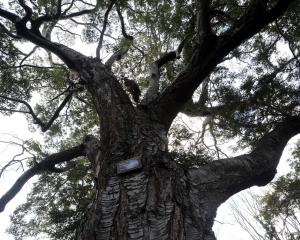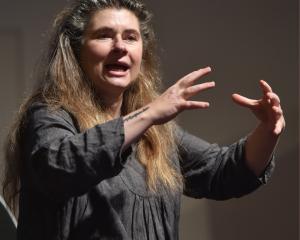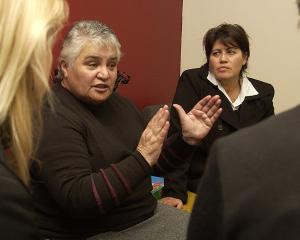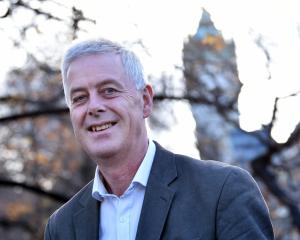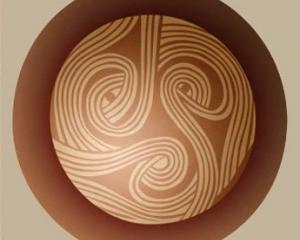
It's not surprising Knox Church has a reputation for being inclusive and broadminded.
From its beginnings in 1860 as Dunedin's second Presbyterian church, Knox included not only Presbyterians, but also Methodists, Congregationalists and other Protestants who did not yet have their own places of worship.
• Slideshow: Knox Church celebrates 150th
The new congregation sought a minister who would be "large-minded, prudent, affable, gentle yet firm, and ready for every good work" as well as being "pious, energetic and godly", according to Prof Angus Ross in his book They built in faith (1976).
They found their man in the genial Scotsman, Donald McNaughton Stuart, who remained as their minister until his death in 1894, establishing a progressive tradition that continues to this day.
Confronted early on by the gold-rush boom, Dr Stuart embraced the multifarious new throng, according to Richard Huber who has written a play, Voice of Heaven, for the 150th anniversary of the parish which will be celebrated this week .
It follows Home, which he wrote for First Church's son et lumiere show last year.
• Play reveals Dr Stuart's private life
Although both stemmed from the Free Church of Scotland which founded Otago, Knox was always of a more liberal persuasion than First Church, he says.
However, the freedom of coming to New Zealand offered immigrants not only the chance to start new lives, but also the opportunity to reorient their belief systems.
• Settled on a strong foundation
"The Presbyterian movement mostly centred around the historical figure of John Knox. They were very radical figures - they smashed churches and they broke up organs. They had a very radical approach to the establishment of their religion.
"By the time those people came here, there were no churches to smash, there were no organs to break, there were only churches to make. I think that difference of place and difference of circumstances tempered them and made them more liberal."
The open-mindedness, scholarship and social justice developed by Dr Stuart have been a hallmark of Knox for 150 years, although changing with the times.
The Rev Dr Sarah Mitchell, the present minister, considers one of Knox's strengths to be the spirit of openness and inquiry, and the freedom it allows people to explore and express themselves.
"We think this makes more sense, but we are not trying to say other people's way of doing things is not right because we know we haven't got it either - nobody's got it all. We are all trying to make sense of this bigger story that encompasses us all," she says.
Although not a signed-up member of the progressive Christianity movement, Knox embraces its concepts.
"It values intellectual integrity as well as spiritual vitality, so you have a combination of a strong spiritual focus on living what we call the dangerous memory of Jesus, within a well-schooled academic approach which includes theology but also brings in science, philosophies of religion, and different sociological approaches, so it's strongly grounded in intellectual rigour, and that's been the case for all the life of Knox," Dr Mitchell said.
Last year the congregation celebrated the 200th anniversary of Darwin, who formulated the theory of evolution.
Prof George Petersen, an expert in bioethics and an elder of the church, spoke on what it meant to be a Christian and a scientist, she said.
"That kind of thing doesn't faze anyone at Knox."
That does not mean tradition is ignored, she says.
"We put our own experience of God alongside the stories of faith of previous generations and seek to understand this `godness,' this divine mystery - whatever you name it - that we know we will never be able to fully understand.
"It's outside us, not in terms of up there, but all-encompassing and holding the whole of reality within it.
"Sometimes we use the language of divine mystery, sometimes of creativity, but we don't tend to very often use language of `father' which would be a traditional way of addressing God.
"It's trying to get in touch with the `more' - the `more' that is beyond who we are."
The Knox congregation has not been afraid to stand up for its liberal beliefs.
Recently it recorded its dissent against a ruling of the Presbyterian Church's governing body, the general assembly, that excluded not only homosexuals but also all those who were in a sexual relationship outside of marriage from becoming ministers, elders or other church leaders.
It was totally discriminating and seemed very anti-Christian, according to Carolyn Richardson, joint session clerk and co-convener of the 150th celebrations planning committee.
The decision was unanimous, although the congregation also embraces people who think more traditionally, she says.
There is now an attempt to live with the opposing views, according to Dr Mitchell.
Social justice has always been important at Knox, although it has been enacted in different ways in different periods, Dr Mitchell says.
"In Dr Stuart's day he used to take blankets to people who didn't have enough coverings.
"Today that is looked after by social service agencies of the church and others," she said.
Now the church works with Youthgrow, Presbyterian Support Services, the Corrections Facility at Milburn, and the Orokonui Sanctuary.
Whereas in the past the congregation supported individual missionaries, it now supports Christian World Service, the international aid agency for churches, and promotes Fair Trade.
"It's more about working in partnership with people now, rather than sending missionaries.
"It's more working together and enabling people on the ground to have the authority and power to effect change in their own lives."
Knox Church is also proud of its musical tradition.
Although the Free Church originally opposed the use of musical instruments, after three attempts the congregation voted to install an organ in the 1880s.
As reported later in the Otago Daily Times, an old character who loved music but opposed the organ told Dr Stuart "When you get the kist o' whistles you'll see the backside o' me," but after hearing the opening recital by organist AJ Barth he changed his tune and became "absolutely enamoured with the effects produced by the beautiful instrument".
The choir, conducted by the church's musical director, Karen Knudson, sings a range of music within the classical tradition, from 13th-century chants to works by contemporary New Zealand composers.
Despite falling congregation numbers in many churches, Mrs Richardson feels Knox has a greater chance of surviving because of its progressive stance and its policy of making religion more relevant to people in a modern world.
Although an inner-city church, its members come from many parts of the city and from as far away as Taieri Mouth and Waitati, but every Sunday new people come to services.
"There are a number of people on a spiritual search who have walked away from the Church in the past and return with a sense of yearning. They are delighted, as one person said to me the other day, delighted to be given enough elbow room to explore, and not be hemmed in," Dr Mitchell says.



